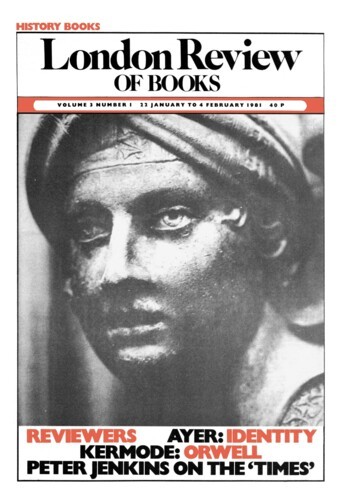When Raymond Asquith died in the Battle of the Somme, Winston Churchill grieved for ‘the loss of my brilliant hero-friend’, and the Prime Minister’s son became a symbol of the talent of a whole generation. He is mentioned in countless memoirs, but until the publication of this volume Asquith has never possessed any definite literary personality to give documentary substance to the legend of tragically sacrificed brilliance. He was 38 when he was killed, no mere promising BA sent straight from Oxford to the trenches: the achievement of a fuller lifetime was beginning to form by the time of his death. Recollection of promise has until now been all that remained, along with fragrant but sincere declarations from adoring disciples such as Lady Diana Cooper, who ‘loved Raymond hopelessly’ but could scarcely bear to write about him in her autobiography.
Most of his admirers noted an ironic, sometimes a callous streak in his nature, which suggested that there could be more of interest to this dead hero than might be expected. An edition of his letters was considered just after his death, to make one of those memorial volumes like the compilation Mr Samgrass was editing so tactfully for Lady Marchmain in Brideshead Revisited. Raymond Asquith’s correspondence was found to have a vigour and frankness which made immediate publication undesirable, and the letters were put away to be published only after his widow’s death. She outlived him by 60 years, and at last this memorial compilation can see the light of day, the letters including a few of Asquith’s verses, such as the fine parody of Kipling’s ‘Soldiers of the Queen’:
The sun like a Bishop’s bottom
Rosy and round and hot
Looked down upon us who shot ’em
And down on the devils we shot ...
Mr Jolliffe’s selection gives enough of the already strikingly mature Winchester and Balliol letters to show where the reputation for brilliance arose, but fortunately there is even more of his later correspondence in which we can see how the brittle cleverness of the youthful letters was tempered, but not muzzled, by Asquith’s courtship of Katharine Horner and particularly by his experiences in the trenches. Many of the early letters have traces of what he himself called ‘the prize essay manner’, displayed least agreeably in a disdainful Wykehamist superiority, clever enough but too easily contemptuous of ‘provincialism’ and other despised shibboleths. The manner is vivid but rarely witty, and it gains much from family political connections which enabled him to discuss public figures with assuredness: he saw Chamberlain as ‘a statesman quite in the second class; an engineer, not an architect – full of small ingenuity and cleverness, but quite unable to take a synoptic view of things; he has never really emerged from Birmingham and the tin-tacks that made him.’ Such a style makes a deeply-felt religious scepticism appear mainly as a disrespectful anticlericalism, which has its moments when elevated to an episcopal degree: at All Souls he watched ‘Stepney and Cantuar – both drunk – trying to cheat one another at poker; it was a very even match; for tho’ Stepney was far more cunning, Cantuar was far less drunk.’
A tone like this offered some protection against the boredoms of the period. Vacuous political golfing parties at North Berwick were part of his upbringing, and not all house-parties had eminences like Rosebery or Haldane (‘the brain of Socrates and the shape of Nero’) to give them an intellectual element. More often there was a Philistinism about such gatherings which he found repugnant: ‘By dint of steadily abusing Meredith as obscure and precious and occasionally attending matins with my hostess in a little white church in the park,’ he wrote on one visit, ‘I have done much to condone the offence of my intellectual achievement and promise.’
By the time war broke out, Raymond Asquith was well-established with a wife and family, embarked on a successful career at the bar, and was the adored leader of a younger social group to whom his irreverence had a special appeal. These new friends of ‘the Coterie’ provided him with a wider audience for his letters from France and Belgium – a hundred pages of characteristically high-spirited military reportage, which are the real justification for this collection. But on military service, even more than in the duller periods of an international arbitration case or a vapid Edwardian weekend, boredom would keep breaking in. ‘My prospects of really serious and strangling boredom have never been higher,’ he wrote from the Guards camp at Bovingdon as the autumn rains of 1915 settled in, and even within sound of the big guns the conventional, formalised aspects of the war, the demoralising periods of waiting, are uppermost in his reports. It was diverting to become involved in an epistolary flirtation with the lovely young Lady Diana Manners, diverting to recommence his old condescensions, berating lesser regiments from the heights of his Grenadier magnificence: but such playfulness never disguised the dulling monotony of the routines of trench warfare, which comes over in the letters even more tellingly than the ‘frightfulness’ of battle. Stagnation of movement and morale was rarely alleviated, but when a major action came, the end was sudden and bloody: 17 of the 22 officers in his battalion were killed or wounded. Raymond Asquith did not survive.
Send Letters To:
The Editor
London Review of Books,
28 Little Russell Street
London, WC1A 2HN
letters@lrb.co.uk
Please include name, address, and a telephone number.

